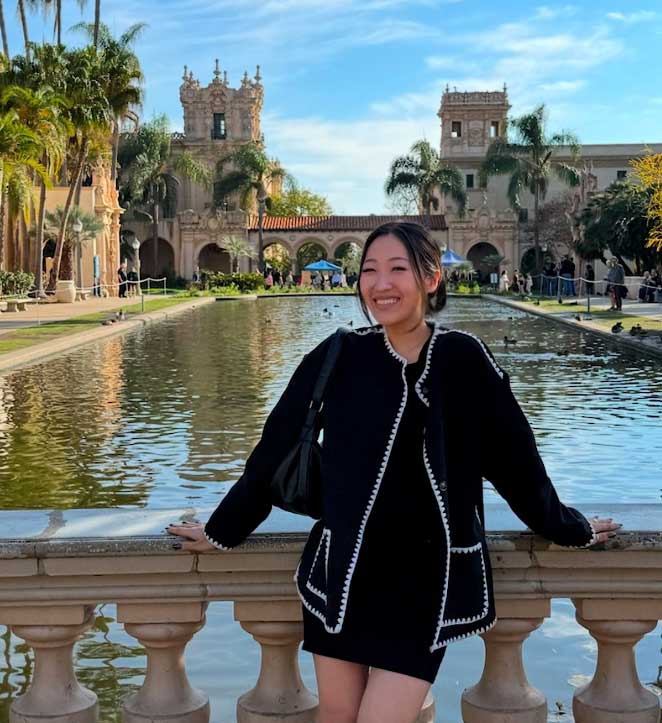Chi Baik is a fourth-year doctoral candidate in Special Education at UW whose work focuses on early communication for children with cognitive disabilities and inclusive teaching practices. She coordinates community programs through the Haring Center in partnership with Open Doors for Multicultural Families. Read her Q&A below to learn more about her!

Can you tell us a bit about yourself and what you’re focusing on in your doctoral studies? What inspired you to pursue this path?
My name is Chi Baik and I am entering my 4th year here at UW! I am a doctoral candidate studying Special Education and I’m working on my dissertation this year. I am originally from Seoul, South Korea but immigrated to the US when I was 4. I grew up in Silver Spring, MD which is right outside of Washington D.C.! Prior to moving to Seattle for school, I was a preschool special education teacher supporting young children with extensive support needs.
Through my own professional experiences, I became passionate about providing high-quality early support for children with significant cognitive disabilities. In particular, my research focuses on improving communication outcomes for young children who do not yet have access to systematic forms of communication. I am also interested in the impact of teachers’ perceptions of disability on teaching and inclusionary practices.
How did you get involved with the Haring Center, and what has your role been in the collaboration with Open Doors for Multicultural Families (ODMF)?
My advisor, Dr. Angel Fettig, is the director of research at the Haring Center! Through her, I’ve become more involved in research and partnership efforts with the community. Specifically, our lab has collaborated with ODMF (https://opendoorswa.org/), an organization that supports multicultural students and their families in navigating special education services.
Our role in that support has mainly been to provide children and families with opportunities to attend early learning playgroups and parent education seminars! UW students plan and lead these sessions and it has been an awesome way to collaborate and connect with students and families in our community. My role is to coordinate these efforts with ODMF as well as assist in planning/leading sessions.
What does a typical day look like for you coordinating the lab efforts with ODMF, and what kinds of work or support do you provide to families?
My day-to-day work with ODMF can look very different! My main responsibility is to make sure everything is planned and ready so that things run smoothly. This generally just means a lot of email correspondence. In collaboration with UW, we run monthly playgroups and parent trainings. Our playgroups are planned and led by a group of our Master’s students who study either Special Education or Speech-Language Pathology. These playgroups have a different, culturally-relevant theme for families each month.
For example, some of our themes this past year were: Indigenous Heritage Month, Eid and Ramadan, Cinco de Mayo, and Lunar New Year. The goal of these playgroups is to encourage and support parent-child interactions for children with disabilities. Students create lessons plans (which I’ll review and coordinate materials for) and implement them once a month in 3-hour sessions.
For our parent trainings, our doctoral students in Dr. Fettig’s lab, who are all studying Special Education, plan and lead sessions. Session topics are decided in collaboration with ODMF and reflect families’ interests. Some of our topics last year were: Disability Resources/Advocacy, Child Development/Social Skills, Therapies and Related Services, and Challenging Behaviors.
Students create about an hour-long presentation with relevant resources and then have time for a Q&A from families. These sessions are delivered online once a month and, in the evenings, to be flexible and meet families’ needs.
Through your work with ODMF and the families they serve, what have been some of the most meaningful experiences or lessons you’ve taken away?
As a child who grew up in a low-income, immigrant family whose parents were not proficient in English and did not know how to navigate school systems, I understand the impact of the work that ODMF does on a personal level. I am so happy to see that there are organizations like ODMF who are dedicated to supporting families like mine and even happier that I get to support them in their work.
I would say that my most meaningful experiences have been in seeing the relationships between children, families, UW students, and ODMF staff grow throughout our partnerships together. We often see the same children and families attend our playgroups and parent trainings and it’s wonderful to get to know each other not just on a professional level, but on a more personal level as well.
Outside of your research and work, what do you enjoy doing in your free time?
In my free time, you can catch me at a lot of different concerts because I love live music! I also love enjoying the beautiful weather in Seattle and am usually lounging on the beaches in the summer. When I’m inside, I spend a lot of time doing puzzles, solving crosswords/sudoku, or building legos.